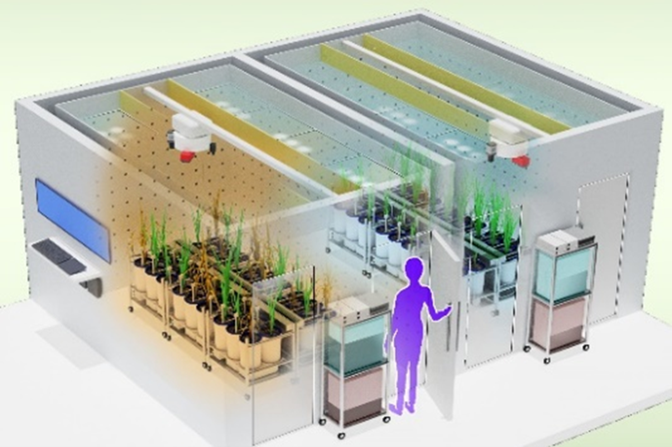A research group led by the National Agriculture and Food Research Organization (NARO) has built a plant phenotyping platform that can automatically manage plant cultivation and acquire images and environmental information in an indoor environment. This platform mimics extreme cultivation conditions such as drought in an indoor growth chamber and the status of plants can be monitored from remote location using multiple cameras installed on the ceiling. This platform can visualize and record subtle changes in plants, such as stress responses. It is possible to discover previously undiscovered stress tolerance genes in wild plants and it can be expected to be used for crop breeding in anticipation of the hostile global environment in the future.
Overview
By utilizing Internet of Things (IoT) and sensor technology, we built a plant phenotyping platform "iPUPIL" (IoT-based Platform of Unmanned Phenotyping with Imitated Land condition) that can automatically manage plant cultivation and acquire images and environmental information in an indoor environment.
In recent years, drought and soil degradation have occurred on farmlands around the world due to global environmental changes. Even in Japan, the natural environment surrounding agriculture and economic conditions are undergoing major changes, such as extreme rainfall and soaring fertilizer prices in recent years. Therefore, there is a demand for the development of cultivars that can rapidly respond to these changes.
This platform mimics arbitrary weather and environmental conditions in an indoor growth chamber, regardless of the season. A movable camera control system installed on the indoor ceiling enables unmanned observation of plant growth until harvest stage. In addition, each pot installed in the climate chamber can mimic the soil environment (water and nutrient conditions) according to the purpose by the cultivation control system. In addition, local environmental data such as illuminance, temperature and humidity, soil moisture content, and soil temperature can be measured for each pot. This platform enables automatic management and remote control once the cultivation and imaging conditions are set, and hence there is no need for a person in charge to open and close the door each time during the cultivation control and measurement process. As a result, there is almost no change in the indoor environment due to opening and closing, making it possible to acquire more accurate plant growth data.
This platform provides a cultivation environment for evaluating cultivars that are adapted to future adverse environments, such as cultivars that are resistant to drought and flood damage, and cultivars that grow well with less fertilizer. In addition, iPUPIL is expected to accelerate the development of cultivars using new breeding technologies such as genome editing.
This platform is supported by the Moonshot Program for agriculture, forestry and fisheries "Achieving zero food risks by improving crop robustness using cyber-physical systems" and it was designed and developed to support the discovery of unused genetic resources and the construction of crop design technology that utilizes cyber-physical systems.
The commercialization of iPUPIL is not yet decided at present as this platform is a research prototype. In the future, we will continue to improve and consider commercialization so that it can be widely used by other researchers and private companies.

Reference
Numajiri Y., Yoshino K., Teramoto S., Hayashi A., Nishijima R., Tanaka T., Hayashi T., Kawakatsu T., Tanabata T., Uga Y. (2021) iPOTs: Internet of Things-based pot system controlling optional treatment of soil water condition for plant phenotyping under drought stress. The Plant Journal 107: 1569-1580. doi.org/10.1111/tpj.15400
For Inquiries
Contact: http://www.naro.go.jp/english/inquiry/index.html




